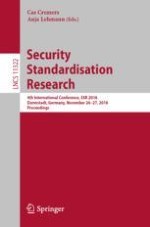2018 | OriginalPaper | Buchkapitel
Identity Confidentiality in 5G Mobile Telephony Systems
verfasst von : Haibat Khan, Benjamin Dowling, Keith M. Martin
Erschienen in: Security Standardisation Research
Aktivieren Sie unsere intelligente Suche, um passende Fachinhalte oder Patente zu finden.
Wählen Sie Textabschnitte aus um mit Künstlicher Intelligenz passenden Patente zu finden. powered by
Markieren Sie Textabschnitte, um KI-gestützt weitere passende Inhalte zu finden. powered by
